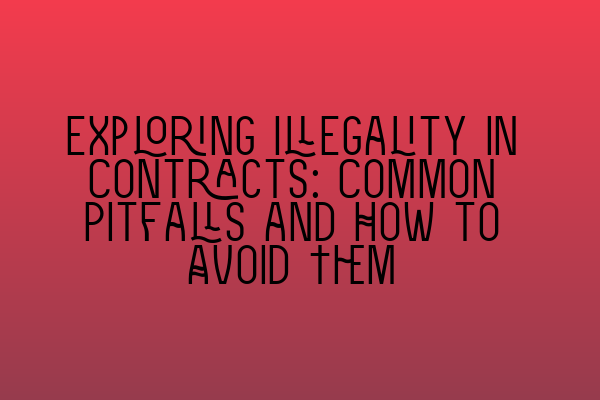Exploring Illegality in Contracts: Common Pitfalls and How to Avoid Them
Contracts form the foundation of business transactions, outlining the rights and obligations of parties involved. However, not all contracts are enforceable under the law. The concept of illegality in contracts refers to situations where a contract violates statutory provisions, public policy, or common law principles. As a solicitor dealing with contract law, it is crucial to understand the common pitfalls associated with illegality and how to avoid them. In this article, we will delve into this topic, providing you with valuable insights and guidance.
Before we proceed, it is essential to note that contract law can be complex and varies from jurisdiction to jurisdiction. Consulting legal professionals and conducting thorough research are necessary steps in navigating the intricacies of contract law. Now, let’s explore some common pitfalls that can arise when dealing with illegality in contracts and how to mitigate these risks:
1. Contracts Contrary to Public Policy:
Certain contracts that go against public policy are considered illegal and unenforceable. Examples of such contracts include those involving fraud, restraint of trade, gambling, and bribery. It is crucial to conduct due diligence and ensure your clients are not entering into contracts that contravene public policy.
Additionally, familiarize yourself with case law and statutory provisions related to public policy to advise your clients effectively. Stay up-to-date with legal developments and seek clarification from senior colleagues or legal databases to strengthen your understanding of this complex area.
For a deeper understanding of navigating legal challenges and pitfalls, refer to this informative article: Navigating Legal Challenges and Pitfalls in Your Practice.
2. Illegality Resulting from Statutory Violations:
Contracts that breach statutory requirements or regulations can also be deemed illegal. This may include contracts related to banned substances, unauthorized financial activities, or environmental violations. Stay updated with industry-specific regulations and advise your clients accordingly to avoid any legal implications.
3. Contracts With Unlicensed Parties:
Entering into contracts with parties who lack the required licenses or authorizations can render the contract illegal. It is crucial to verify the credentials and licenses of the parties involved in the contract. Ensure that all necessary licenses and permits are in place to safeguard the validity of the contract.
4. Contracts Against Competition Law:
Engaging in anti-competitive practices, such as price-fixing agreements or market allocation, can result in contracts being deemed illegal. Stay vigilant and advise your clients on the importance of complying with competition laws to avoid legal issues.
For more insights into the ethical responsibilities of solicitors and upholding professionalism, we recommend reading this informative article: Ethical Responsibilities of Solicitors: Upholding Professionalism.
5. Illegal Contracts Involving Misrepresentation or Duress:
Contracts entered into under duress or based on misrepresentation can be considered illegal and unenforceable. As a solicitor, it is vital to counsel your clients on the importance of full disclosure and ensuring contracts are entered into voluntarily. Identify any potential signs of coercion or misrepresentation and provide guidance accordingly.
6. Illegality Arising from Breach of Intellectual Property Rights:
Contracts involving the infringement of intellectual property rights, such as copyright, trademarks, or patents, can be deemed illegal. Advise your clients on the importance of respecting intellectual property rights to avoid potential legal disputes.
To gain a comprehensive understanding of the differences between barristers and solicitors, we recommend reading this insightful article: Barrister vs. Solicitor: A Comprehensive Comparison.
How to Avoid Common Pitfalls:
Now that we have explored common pitfalls related to illegality in contracts, let’s delve into strategies to help you and your clients avoid these pitfalls:
1. Conduct Thorough Due Diligence: Before entering into a contract, thoroughly investigate all parties involved, ensuring that they are reputable and have the necessary licenses or authorizations.
2. Stay Informed: Stay up-to-date with relevant statutory requirements, regulations, and case law related to contract law and illegality. Continuously educate yourself on changes in legislation and legal interpretations.
3. Seek Legal Advice: If you are unsure about the legality of a contract or the risks involved, always seek advice from experienced legal professionals. They can provide guidance tailored to your specific situation.
4. Draft Carefully: When drafting contracts, ensure that they are clear, unambiguous, and compliant with the law. Avoid using vague or language that could potentially breach statutory requirements.
5. Encourage Open Communication: Promote open and honest communication between all parties involved in a contract. Encourage your clients to disclose all relevant information and potential risks.
6. Regular Training and Professional Development: Participate in training programs, attend seminars, and engage in continuous professional development to deepen your understanding of contract law and related legal concepts.
For a comprehensive guide on understanding the SRA Competence Statement, we recommend reading this informative article: Understanding the SRA Competence Statement: A Guide for Solicitors.
In conclusion, understanding the common pitfalls associated with illegality in contracts is crucial for solicitors. By staying informed, conducting due diligence, seeking legal advice, and implementing effective strategies, you can mitigate risks and help your clients navigate the complexities of contract law.
Lastly, building a strong network is essential for solicitors. To learn more about networking strategies for solicitors, take a look at this insightful article: Networking for Solicitors: Strategies for Building a Strong Network.
Remember, this article is for informational purposes only and should not be considered legal advice. Always consult with experienced legal professionals for guidance specific to your situation.
